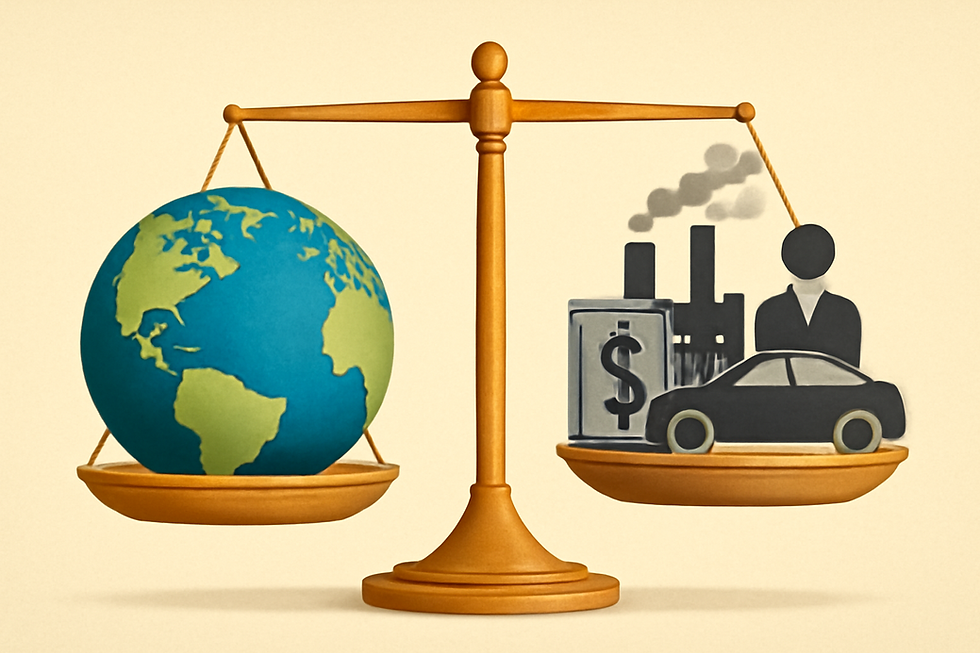Germany’s fiscal Waterloo: Will Chancellor Scholz’ coalition be shipped to St. Helena?
- Hans Bellstedt Public Affairs

- Nov 22, 2023
- 3 min read
As director Ridley Scott’s “Napoleon” movie comes out, it can be stated that November 15th, 2023 has been the German governing coalition’s Waterloo. On this day, the Federal Constitutional Court declared that Chancellor Olaf Scholz’s alliance of (his own) Social Democrats, the Greens and the Free Democrats have breached the constitutional debt brake by transferring, upon launching their “traffic light” project in late 2021, 60 bn Euros of unused Covid-19 rescue funds into the so-called Climate and Transformation fund. This special debt vehicle was designed to subsidize the German industry’s as well as the transport and building sector’s migration towards climate neutrality. But, with the Court ruling that financial means unspent in the past must not be transformed into future budgets, the Chancellor’s troops feel their faces being painfully pressed into Wallonian soil.
The verdict puts a brutal end to a fairly audacious budgetary approach differentiating between the “core budget” and so-called “Sondervermögen” (special budgetary capacities). In fact, Finance Minister and Liberal party chief Christian Lindner has tabled a core budget in compliance with constitutional (and Maastricht) limits. However, implementing the gigantesque transformation agenda of Economics and Climate Minister Robert Habeck (Greens) as well as the Social Democrats’ ambition to further expand the welfare state requires extra funds worth hundreds of billions of Euros. At this point, the Federal Court drew a clear line in the sand: Whereas no objections whatsoever have been expressed with regard to the 100 billion Euros specifically allocated, a few days after Putin’s brutal attack on Ukraine, to the rearmament of the German military (Chancellor Scholz’ famous “Zeitenwende”, or turn of the times), fighting climate change or boosting welfare do not justify budgetary alchemy where unbacked funds high in the twelve (sic!) figures are virtuosically shifted from one fiscal year to another. Thus, the German Christian Democrats who had taken the traffic light’s budgetary trick to court, are carrying home a victory comparable to the one achieved by General Wellington and Field Marshal Blücher in June 1815.
Will this lead to a fiscal restoration of historical size? Already, the Federal coalition has begun to turn upside down every single Euro in order to define which spendings are still possible. Simultaneously, Minister Lindner has decreed an immediate spending ban. Notwithstanding, it is unclear if, how and when the 2024 budget will pass the Bundestag. And while the Christian Democrats, in parliamentary opposition, cooly seize their opportunity to position themselves as guardians of taxpayers’ money, the governing coalition finds itself squeezed between a quest for a 2/3 majority in parliament necessary to soften the debt brake (refused by the opposition), painful spending cuts (unloved by both the SPD and the Greens) or the escape into tax increases fervently excluded by the Free Democrats. We may find out by Christmas whether Mr Scholz will find ways and means to overcome this deadlock. If he fails, himself and the ministers of his self-dubbed “coalition of progress” may well end up getting their bags packed and being shipped to their political St. Helena.
Meanwhile, as United Government Affairs, we also have to look at possible impacts on the European scale. As the Financial Times reported on November 18th, German diplomats in Brussels have immediately put a bold question mark behind the European Commission’s recent ask for an extraordinary transfer, by the Member States, of 100 bn Euros needed to further support Ukraine, but also to repay common debt, tackle migration and – of all purposes – “a salary increase for EU officials”. With explicit reference to the recent verdict, the German EU ambassador has allegedly rejected these demands in all clarity. Further, we can expect that Finance Minister Lindner’s (limited) willingness to agree to a less strict EU stability and growth pact, as demanded especially by Paris and Rome, will shrink even more. “Cher Bruno”, Lindner might text-message to his esteemed counterpart at Bercy, “even if I wanted the deal – how am I supposed to run the risk of being called back by my Constitutional Court a second time?” Thus, the Federal Court’s decision, while dramatically shaking up German domestic politics, also casts a dark shadow on the EU’s future capabilities to tackle global and transformational challenges. In historic terms, the hour for a new Vienna Congress may have arrived.



Comments